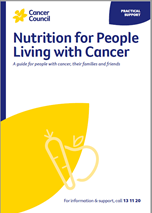- Home
- Pleural mesothelioma
- Managing symptoms
- Poor appetite and weight loss
Poor appetite and weight loss
Some people have little interest in eating and lose weight even before mesothelioma is diagnosed. These symptoms may be caused by the disease itself, or by nausea, trouble swallowing, changes in taste or smell, breathlessness, abdominal pain, or feeling down (see Living with pleural mesothelioma).
Eating well will help you cope better with day-to-day living, treatment and side effects, and improve your quality of life.
A palliative care specialist can help manage symptoms that affect your appetite or ability to eat. You may also find it useful to talk to a dietitian who is experienced in treating people with cancer. They can provide helpful eating suggestions.
Eating when you have little appetite
- Have small meals and snacks regularly. A large, full plate may put you off eating – try using a smaller plate with smaller portions. Likewise, drink from a half-full glass.
- Eat moist food such as scrambled eggs. Moist food tends to be easier to eat and will cause less irritation if you have a sore mouth.
- Avoid fatty or sugary foods if these make you feel sick.
- Use lemon juice and herbs to add flavour to bland food.
- Eat more of your favourite foods – follow your cravings.
- If solid food doesn’t appeal, ask a dietitian about protein drinks or other supplements.
- Learn more about nutrition and cancer, and listen to our podcast below.
→ READ MORE: Palliative treatment for pleural mesothelioma
Podcast: Appetite Loss and Nausea
Listen to more episodes from our podcast for people affected by cancer
Video: How to eat well after a cancer diagnosis
More resources
All updated content has been clinically reviewed by A/Prof Anthony Linton, Medical Oncologist, Concord Cancer Centre and Concord Repatriation General Hospital, NSW; Dr Naveed Alam, Thoracic Surgeon, St Vincent’s Private Hospital Melbourne and Monash Medical Centre, VIC; Prof David Morris, Peritonectomy Surgeon, St George Hospital and UNSW, NSW. This edition is based on the previous edition, which was reviewed by the following panel: A/Prof Anthony Linton (see above); Dr Naveed Alam, (see above); Donatella Arnoldo, Consumer; Polly Baldwin, 13 11 20 Consultant, Cancer Council SA; Dr Melvin (Wee Loong) Chin, Medical Oncologist, Sir Charles Gairdner Hospital and National Centre for Asbestos Related Diseases, WA; Prof Kwun Fong, Thoracic and Sleep Physician and Director, UQ Thoracic Research Centre, The Prince Charles Hospital, and Professor of Medicine, The University of Queensland, QLD; Vicki Hamilton OAM, Consumer and CEO, Asbestos Council of Victoria/ GARDS Inc., VIC; Dr Susan Harden, Radiation Oncologist, Peter MacCallum Cancer Centre, VIC; Penny Jacomos, Social Worker, Asbestos Diseases Society of South Australia, SA; Prof Brian Le, Director, Parkville Integrated Palliative Care Service, The Royal Melbourne Hospital and Peter MacCallum Cancer Centre, VIC; Lung Cancer Support Nurses, Lung Foundation Australia; Jocelyn McLean, Mesothelioma Support Coordinator, Asbestos Diseases Research Institute, NSW; Prof David Morris (see above); Joanne Oates, Registered Occupational Therapist, Expert Witness in Dust Diseases, and Director, Evaluate, NSW; Chris Sheppard and Adam Barlow, RMB Lawyers.
View the Cancer Council NSW editorial policy.
View all publications or call 13 11 20 for free printed copies.

